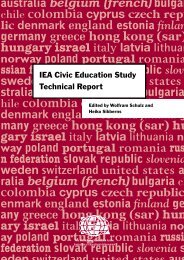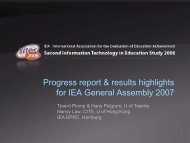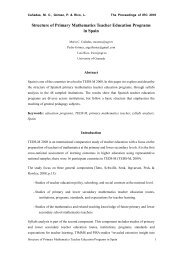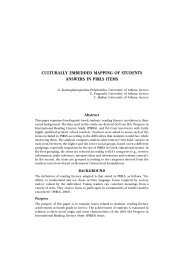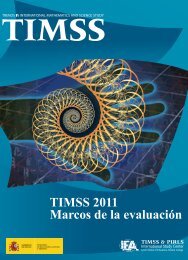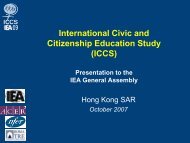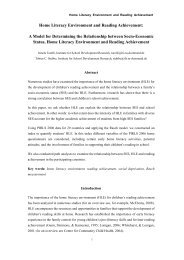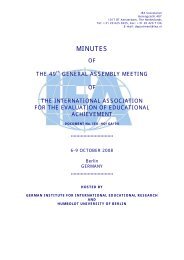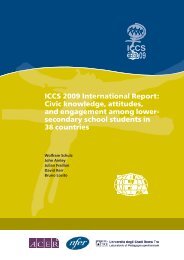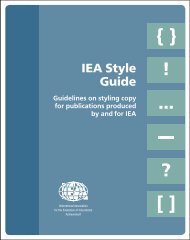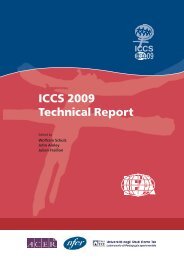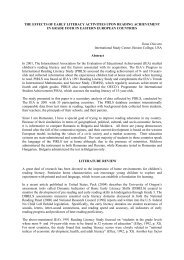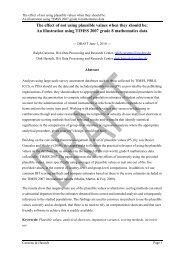International civic and citizenship education study - iccs - IEA
International civic and citizenship education study - iccs - IEA
International civic and citizenship education study - iccs - IEA
- TAGS
- civic
- citizenship
- iccs
- www.iea.nl
Create successful ePaper yourself
Turn your PDF publications into a flip-book with our unique Google optimized e-Paper software.
Overview<br />
Purpose of the <strong>study</strong><br />
The purpose of the <strong>International</strong> Civic <strong>and</strong> Citizenship Education Study (ICCS) is to investigate, in<br />
a range of countries, the ways in which young people are prepared <strong>and</strong> consequently ready<br />
<strong>and</strong> able to undertake their roles as citizens. In pursuit of this purpose, the <strong>study</strong> reports on<br />
student achievement in a test of conceptual underst<strong>and</strong>ings <strong>and</strong> competencies in <strong>civic</strong>s <strong>and</strong><br />
<strong>citizenship</strong>. It also collects <strong>and</strong> analyzes, as additional outcome variables, data about student<br />
activities, dispositions, <strong>and</strong> attitudes related to <strong>civic</strong> <strong>and</strong> <strong>citizenship</strong> <strong>education</strong>. The collection<br />
of contextual data will help explain variation in the outcome variables. The proposal builds on<br />
the previous <strong>IEA</strong> studies of <strong>civic</strong> <strong>education</strong>, acknowledges the need for a new <strong>study</strong>, <strong>and</strong> is a<br />
response to the challenge of educating young people in changed contexts of democracy <strong>and</strong><br />
<strong>civic</strong> participation.<br />
Background to the <strong>study</strong><br />
Previous <strong>IEA</strong> studies<br />
The <strong>International</strong> Association for the Evaluation of Educational Achievement (<strong>IEA</strong>) has already<br />
carried out two international surveys of student characteristics in the domain of <strong>civic</strong> <strong>education</strong>.<br />
The first such <strong>study</strong> (Torney, Oppenheim, & Farnen, 1975) was conducted as part of the socalled<br />
Six Subject Study, with data collected in 1971 (for a summary, see Walker, 1976). The<br />
second <strong>study</strong>, the <strong>IEA</strong> Civic Education Study (CIVED), was carried out in 1999. It was designed<br />
to strengthen the empirical foundations of <strong>civic</strong> <strong>education</strong> by providing up-to-date information<br />
about the <strong>civic</strong> knowledge, attitudes, <strong>and</strong> actions of 14-year-olds.<br />
CIVED had a twin focus on school-based learning <strong>and</strong> on opportunities for <strong>civic</strong> participation<br />
outside the school. CIVED concentrated on three <strong>civic</strong>-related domains: democracy/<strong>citizenship</strong>;<br />
national identity/international relations; <strong>and</strong> social cohesion/diversity. It was argued that the<br />
research outcomes from a <strong>study</strong> focusing on these domains would be particularly useful to<br />
policymakers involved in designing or redesigning curricula <strong>and</strong> preparing teachers.<br />
CIVED was successful in meeting its aims <strong>and</strong> objectives. Phase 1 produced a detailed series of<br />
national case studies from the 24 participating countries (Torney-Purta, Schwille, & Amadeo,<br />
1999). Phase 2 produced two data-rich international reports, the first on the results from the<br />
m<strong>and</strong>atory st<strong>and</strong>ard population of 14-year-olds in 28 participating countries (Torney-Purta,<br />
Lehmann, Oswald, & Schulz, 2001), <strong>and</strong> the second from the 16 countries that surveyed an<br />
older, optional population of 16- to 18-year-olds (Amadeo, Torney-Purta, Lehmann, Husfeldt,<br />
& Nikolova, 2002). CIVED’s findings have had a considerable influence on policy <strong>and</strong><br />
<strong>education</strong>al practice in <strong>civic</strong> <strong>and</strong> <strong>citizenship</strong> <strong>education</strong> across the world, in both participating<br />
<strong>and</strong> non-participating countries, <strong>and</strong> have also influenced further research in this area (Kerr,<br />
Irel<strong>and</strong>, Lopes, & Craig, with Cleaver, 2004; Mellor & Prior, 2004; Menezes, Ferreira, Carneiro,<br />
& Cruz, 2004).<br />
Recent changes in the world context of <strong>civic</strong>s <strong>and</strong> <strong>citizenship</strong><br />
In the 10 years since CIVED investigated <strong>civic</strong> <strong>education</strong>, the conditions relevant to <strong>civic</strong>s <strong>and</strong><br />
<strong>citizenship</strong> (especially governance <strong>and</strong> among-nation relations) have undergone considerable<br />
change across the globe. The world context <strong>and</strong> thus the context in relation to both <strong>citizenship</strong><br />
<strong>and</strong> policy <strong>and</strong> practice in <strong>civic</strong> <strong>and</strong> <strong>citizenship</strong> <strong>education</strong> have changed.<br />
ICCS ASSeSSment FrAmework<br />
7



